- Home
- Patricia McLinn
Death on the Diversion Page 4
Death on the Diversion Read online
Page 4
Swearing, from her expression.
Certainly, the people stopped behind her were inclined toward grumbles.
The stoppage rippled to where I stood. A man behind me asked — not in a holiday mood — “What’s the holdup?”
As if seeking the answer, I leaned over the railing and twisted to look up, well past where I knew the holdup originated with Leah. Instead, I tried to see what caught her attention.
Mostly I saw feet through the open space where risers would otherwise be. Male feet, female feet. Tennis shoes, flat sandals, tottering-high-heeled sandals, flip-flops, orthopedic shoes.
I couldn’t identify what Leah was looking at.
She half raised her cane, as if she might hit anyone in front of her. But no one was there, because they’d moved on, while she’d stalled.
“C’mon, lady,” the man behind me called.
Leah started with a wide-angle glare, then focused on me, as if I’d suddenly become a baritone.
I smiled broadly at her.
It was a trick Aunt Kit had told me before the Abandon All interviews started. Someone tries to intimidate you, hit them with a big old smile. Throws them off their stride and makes them wonder what they missed.
Leah started up the stairs, still looking at me.
The smile started to hurt.
CHAPTER SEVEN
We were assigned to the later dinner seating.
Not by the cruise line. By Aunt Kit.
It was the time she preferred and perhaps she thought I preferred it, too, though she never asked. As a matter of fact, I did prefer it. I also was used to it.
Or, suggested a dark, suspicious corner of my mind, Aunt Kit selected it because she knew Petronella would hate it.
“Oh, no, I couldn’t possibly. It’s so late,” she’d moaned at least once every half hour since five o’clock.
“It’s the same time we ate in Barcelona. But if you’re hungry, you don’t have to wait for our time in the dining room, you can eat at the buffet.”
“Oh, I’m not hungry. It’s just so late.”
By the time we were waiting in line outside the dining room — she’d knocked on my door twenty minutes early, sure it would take forever to reach the dining room and if we weren’t there on the dot they would lock us out — I tried another tack.
“You know, Petronella, back at home it’s not late at all. It’s not even two-thirty in the afternoon.”
“Two-thirty? That’s so early for dinner.”
The maître d’ began welcoming diners at the moment. Saving me. Possibly saving Petronella.
We were directed to a great table.
No outside view, but that didn’t matter since it was dark. Not within sight or sound of the kitchen doors, but close enough to avoid what Aunt Kit called the English Manor Issue of food being cold by the time it reached you. Our table for two sat ten inches from a matching one, which gave the option to mingle or not with the people at the next table. On previous cruises, Kit tended not to mingle, I usually did.
Another benefit of our table was I had a great view of most of the dining room, with only the corner behind me cut off.
The couple at the table next to us arrived and introduced themselves as Catherine and Bob. They were Scottish, with dry and roguish senses of humor, experienced cruisers, and good story-tellers.
They talked past the “oh-no-I-couldn’ts” and persuaded Petronella to order two appetizers as we conspired to cover all the menu’s offerings and share tastes. I should say Bob persuaded her. Her unsubtle reliance on his opinion made me squirm, until Catherine, sitting next to me, caught my eye and winked.
They were older than Petronella, yet treated her with a soothing courtesy that relaxed her. I was grateful. And reminded myself that impatience — one of my fortes — only agitated her more.
Waiting for the appetizers, I glanced around.
The faux marble pillars, pastoral mural, and multiple reflective surfaces weren’t my taste, but the room, carved into smaller groupings by curved banquettes, was people-watching paradise.
I won’t detail all the interesting groups and pairings — though a couple not far away were fascinating for how totally unexpressive and untalkative they were — but limit myself to tables that included people I’d already met.
A table for eight, angled slightly left of straight ahead, included Odette, Leah, and Maya, as well as Wardham and Ralph. Three bottles of wine stood on the table, already well depleted.
One seat was empty with the other two assigned to an attractively average couple, perhaps in their early fifties. I’d bet they would beg the maître d’ to change their seats by the next meal.
And not because of Maya or Ralph or Wardham and certainly not because of charming Odette.
Leah Treusault.
The empty chair separated her from the woman in the spare couple. Insufficient barrier, as I knew from the deck chairs earlier. Plus, the angle gave her a direct shot at the male half of the spare couple. Odette, across from the empty chair, seemed to try to deflect Leah’s impact on the younger couple, both by interacting with them and by redirecting Leah’s attention toward Wardham.
Leah barely glanced at him before turning back to the younger couple.
Fresh blood.
The phrase came into my head in Aunt Kit’s voice. But I suspected it was my brain that saw Leah as a carnivorous predator.
She was more commanding than loud, though she was loud enough that her conversations could never qualify as entirely private.
Leah’s interest in another table prompted me to turn my head farther to the left and see the five Valkyries — or should it be Harpies — from the spa, each with a corresponding male, at a round table for ten in the center.
You’d think it would be easy to pair them up into couples. Heck it was fifty-fifty, since they alternated male and female around the table. But I couldn’t spot any favoritism in the touching and talking and flirting.
None at that table paid attention to anyone or anything beyond their group. From my angle it was impossible to tell for sure if one individual was the object of Leah’s attention or if it was the entire table.
I switched back to the table for ten. Nope. Still couldn’t track the precise direction of her interest.
I did notice, however, they’d already killed seven bottles of wine, as well as having a mixed drink at each place.
Her gaze following the direction of mine, Catherine asked, too quietly for our companions to hear, “Father-daughter night?” Then she answered her own question. “Dear me, no, for if they were fathers they’d surely tell those daughters to dress more appropriately.”
I smiled my agreement.
She subtly looked toward the table again, then returned her gaze to me. “I recall a number of them from other cruises.”
“Do you?”
“Oh, yes. Any number of people make the trip regularly. Bob and I aren’t in the every year club, but we come now and then.”
The appetizers arrived, naturally monopolizing the conversation at the same time it broadened to include Petronella and Bob.
Dinner was delightful. For the company as well as the food. As much as I liked Bob and Catherine, I might have liked their effect on Petronella even more. I could feel my shoulders releasing and my forehead smoothing.
We were lingering over multiple desserts — once again shared amongst us — when a new voice rose high and loud.
“Oh! Oh! You’re that writer. The one who wrote Abandon All when you were a baby.” The part about writing Abandon when I was a baby did not compensate for this tall woman with the strong French accent outing me the first night. Some had already left the dining room, but the remaining heads turned toward this beacon of noise.
“How kind of you. Won’t you sit down?” I pushed at the empty chair behind me to encourage her. That would lessen the attention. It also would stop her from half climbing over Catherine’s back.
Besides, I had this routine down. Give a f
ew responses to her effusions about Abandon All, then switch the conversation. Aunt Kit sometimes grumbled that I shut off the spigot of praise too soon because I hadn’t slaved over the book the way she had.
True.
But she hadn’t listened to people talking about it as much as I had.
To end the encounter for good, I brought out the big guns, by questioning the fan about “my” other books.
Some made a graceful exit. Others, like this woman, scrambled hard for the lifeboat to escape the sinking ship of their interest in the conversation.
Okay, again, not the best metaphor. I had to stop thinking about ships sinking.
CHAPTER EIGHT
Music drew me toward the Wayfarer Bar after Petronella and I left Catherine and Bob outside the dining room.
They were heading toward a show and invited us to join them. I’d declined. Petronella said Oh, no, I couldn’t, without indicating why she couldn’t.
Unlike too many musical performances I’d heard on cruises, what came from the Wayfarer Bar was actually, well, musical.
“I’m going to stop in here for a nightcap. Want to come?” I asked Petronella.
“If you don’t mind and you think you’ll be…”
“I’ll be just fine.” To support her faltering step toward expressing her desire, I added, “This is your vacation, too. Do what you want. What do you want to do?”
“I’d like to go to my cabin and have an early night.” Before I could endorse that option, Petronella became flustered. “I should say to your cabin. Not where you’re staying, but your cabin nonetheless, since you so generously paid for it.”
I thought she’d run the excessive gratitude tank empty. Apparently she’d rested enough to refill it.
“Kit did all the work.” As well as paying, but that had to remain our secret. “She planned the whole thing.” At this moment I wasn’t as grateful as I probably should have been. “About all I did was meet you at the airport and follow Kit’s instructions.”
“No, no, no. I know how very much I owe you for your kindness. I’m sure Kit did some, helped you in little ways as she has while she’s lived with you and as I’m determined to do in her absence. But I know who is truly behind this great kindness in my time of need and I can’t possibly thank you en—”
“Kit. All Kit. Like the manicure. All she left for me to do was hand you that unlimited ShipCard and say Knock yourself out.”
“Oh, no. I couldn’t possibly… To impose on you by using that card. No, no, no.”
“It’s already paid for, Petronella. If you don’t use it, it goes to waste.”
“But surely you could get a refund.”
I shook my head firmly. I had no idea how the things worked, but I wasn’t letting any uncertainty show. “No refunds. Only thing to do at this point is get the most value from it by using it all the time.”
“Then perhaps I should…” She cast a weary look toward the entrance of the bar.
“The only should is to do what you want.” I turned her, then took her shoulders from behind. “Rest up tonight. If you feel like being a party animal, we’ll dance the night away tomorrow.”
I nudged her shoulders to start her away from me. She continued moving that direction, but looked back with a sad, slightly scolding smile. “Oh, no, no, I couldn’t possibly.”
* * * *
I could find a seat, then wait for a server to come take my drink order.
But as I walked in, I saw only one server attending several groups beyond where a man with a guitar and woman with a violin sat and played the music that had drawn me.
Another look showed one of those groups was Odette, Leah, and the others. They had empty glasses in front of them and Ralph tried to catch the server’s attention.
Another server showed for an instant, then was recalled to the area reserved for those in the cruise line’s loyalty program. I caught a glimpse of the spa quintet’s leader and the window-sprawler there.
If they duplicated their table’s rate of alcoholic consumption at dinner, they’d have that server tied up for good.
I diverted to the bar.
The redhead from the spa invaders sat on a stool, elbows on the countertop, leaning forward. Which had to give the bartender a mighty fine view down the front of her dress.
The guy next to her — not either of the men she’d sat between at dinner, so presumably not her husband — tried for the same view, but he had a difficult angle to gawk effectively.
She said something, looking at the bartender through her lashes.
He laughed. Loudly. Echoed by the guy next to her.
The guitar player’s head jerked toward the sound. He glared. The woman next to him, with her hands and head occupied with the violin, nudged him with her knee.
He looked at her. Her raised eyebrows acknowledged his right to be irked, but reminded him it did no good. Or maybe I was reading a lot into raised eyebrows.
Apparently, he did, too.
He angled away from the bar.
Through all this — accomplished in a flash — the music never faltered. They were good. Really good. With something deeper than what sounded to me like impressive technical skill. They were connected.
They truly made music together.
The bartender had caught the musician’s reaction, but he was more focused on the redhead departing. “No need to—”
“Thanks for the restaurant tip,” she said loudly and casually.
She pushed past me, her motion turning me partially away from the bar or risk being knocked over. I saw her slide her arm around the neck of a shorter man I’d seen her with in the dining room and now guessed was her husband. She leaned into him as they walked past the musicians and toward the area in back reserved for the frequent cruisers.
“Musicians. Damned touchy artistes. We’re all supposed to sit here like we’re in church and I get nothing in tips. That’s not right,” the bartender grumbled.
Was his grumble about tips? Or being deprived of sight-seeing the redhead?
I’d tip him — but not offer sights — if I could get past the guy who’d been sitting next to the redhead, but his splayed out legs blocked me. And then another man slid onto the stool the redhead abandoned and gave his order.
Sheesh.
The bartender came out of his funk over the loss of the redhead to begin pouring drinks.
The guy blocking me shoulder-butted the newcomer, who drew back in surprise or displeasure or both.
“See that bottle, second from the left,” the first guy said, with no sign he’d noticed the other man’s withdrawal. “That sailboat on the label? That was my grandfather’s boat. I used to have a little boat at the same yacht club. Before the place got overrun. You know. Not our sort.”
Now the newcomer looked offended.
The guy in front of me gave no sign of noticing as he went on about sailboats — his, his grandfather’s, and other people’s — and how they could not possibly stay in some marina where they’d be rubbing hulls with sailboats belonging to lesser mortals.
The bartender delivered his drink then and he turned, showing off one of those tans that makes you think of dust bowls.
Bad enough he blocked me from placing my order, letting the man who’d arrived after me get in first, but now he looked me up and down like he was doing me a favor.
“Excuse me—” My tone meant he should be excusing himself. “—I want to order.”
“I bet you do.” He tried to make it suggestive, which made no sense.
“Excuse me.” That dripped ice.
The guy who’d slipped in ahead of me must have ordered something simple, because he turned away already. I sidestepped Mr. Grandpa’s Sailboat on the Label to get that bar-front spot. As I did, Mr. Sailboat brushed his palm against my hip and started around to my derriere.
I jerked away to leave a gap between us. “Do not touch me.” Not loud, but distinct enough to turn a few nearby heads, including the bartender’s.
/>
“Jason,” I said to the bartender, cribbing off the nametag, “you will need to call security immediately if this passenger bothers me any further.”
“Yes, ma’am. Do you want me to, uh…”
I held Mr. Grandpa’s Sailboat on the Label’s gaze. He’d gone red of cheek and neck, but assumed a smirky grin and raised his hands in would-be innocence, barely missing dribbling his scotch on me. “I’m leaving. No need for hysterics.”
Forget security, I’d throttle the guy myself. Hysterics, my—
I bit my tongue, held my cool, and Mr. Grandpa’s Sailboat on the Label went away.
“I’m sorry, ma’am. If you’d like me to call—”
“What I’d like is a glass of champagne.”
Perhaps by way of amends, Jason came through with Veuve Clicquot.
Jason was in my good books, as my tip showed him.
* * * *
I took a chair by a window. A couple sitting across from me smiled briefly, then returned to absorption in the music. Perfect.
I know a lot of passengers enjoy the energy of the shows in the theaters. I’m closer to Aunt Kit’s viewpoint.
She maintains the shows are impossible to listen to because they are too loud. “How can anyone say they’re any good when the volume is cranked so high it distorts the music? After a few I doubt that’s an accident.”
Had I learned that attitude from her?
But these musicians were good. The guitar and violin supported and enhanced each other. Sometimes swapping the expected roles of strength (guitar) and sweetness (violin), making the most familiar song fresh.
It was lovely.
Except for bursts of sound from the frequent cruisers room.
One particularly raucous episode of laughter, hoots, and shouts prompted me to turn my head.
I couldn’t see the offenders, but I saw Leah standing and starting toward the back area. Odette caught her arm, slowing her, but she would have kept going if Ralph Russell hadn’t stood in her way.
Although I couldn’t hear her, I could see Leah saying things to him. Not nice things.
He stood without responding. She gradually ran out of steam.

_preview.jpg) Almost a Bride (Wyoming Wildflowers Book 1)
Almost a Bride (Wyoming Wildflowers Book 1)_preview.jpg) Prelude to a Wedding (The Wedding Series Book 1)
Prelude to a Wedding (The Wedding Series Book 1) Reaction Shot (Caught Dead in Wyoming, Book 9)
Reaction Shot (Caught Dead in Wyoming, Book 9) Warm Front
Warm Front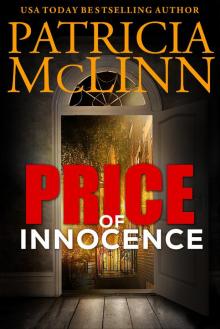 Price of Innocence
Price of Innocence Body Brace (Caught Dead in Wyoming, Book 10)
Body Brace (Caught Dead in Wyoming, Book 10) Death on Covert Circle
Death on Covert Circle Making Christmas
Making Christmas Death on Torrid Ave.
Death on Torrid Ave.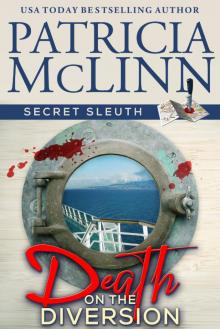 Death on the Diversion
Death on the Diversion The Rancher Meets His Match
The Rancher Meets His Match Widow Woman
Widow Woman The Runaway Bride
The Runaway Bride Hoops
Hoops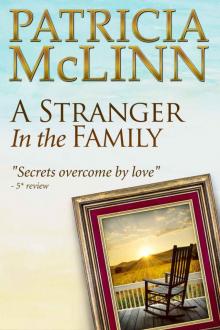 A Stranger in the Family (Book 1, Bardville, Wyoming Trilogy)
A Stranger in the Family (Book 1, Bardville, Wyoming Trilogy)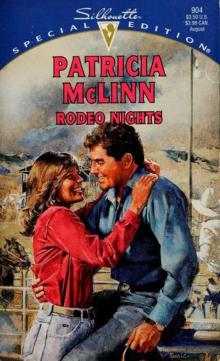 Rodeo Nights
Rodeo Nights Wedding Series Boxed Set (3 Books in 1) (The Wedding Series)
Wedding Series Boxed Set (3 Books in 1) (The Wedding Series)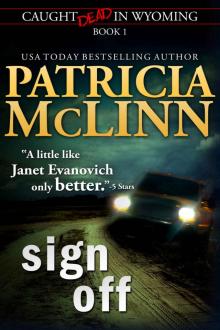 Sign Off (Caught Dead in Wyoming, Book 1)
Sign Off (Caught Dead in Wyoming, Book 1) Prelude to a Wedding
Prelude to a Wedding MATCH MADE IN WYOMING
MATCH MADE IN WYOMING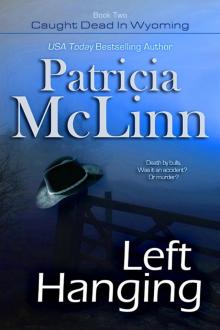 Left Hanging
Left Hanging What Are Friends For?
What Are Friends For?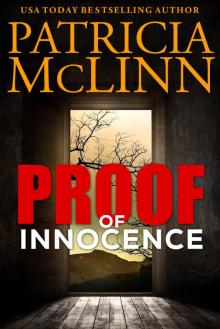 Proof of Innocence
Proof of Innocence Hidden in a Heartbeat (A Place Called Home, Book 3)
Hidden in a Heartbeat (A Place Called Home, Book 3) Baby Blues and Wedding Bells
Baby Blues and Wedding Bells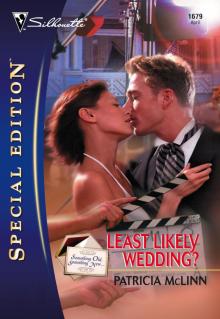 Least Likely Wedding?
Least Likely Wedding? Heart Stealers
Heart Stealers Grady's Wedding
Grady's Wedding Right Brother
Right Brother Wedding of the Century
Wedding of the Century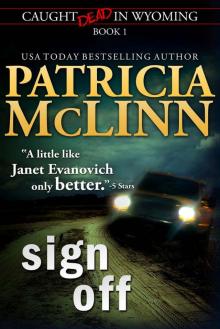 Sign Off
Sign Off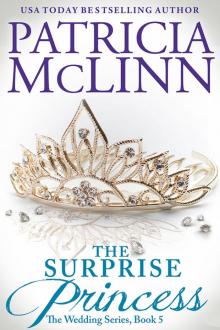 The Surprise Princess
The Surprise Princess Wyoming Wildflowers: The Beginning
Wyoming Wildflowers: The Beginning